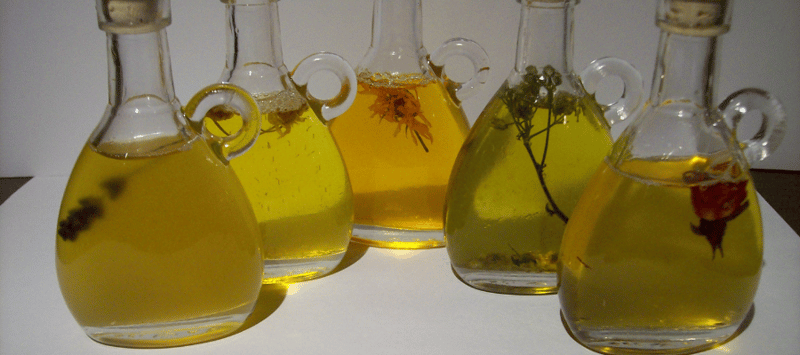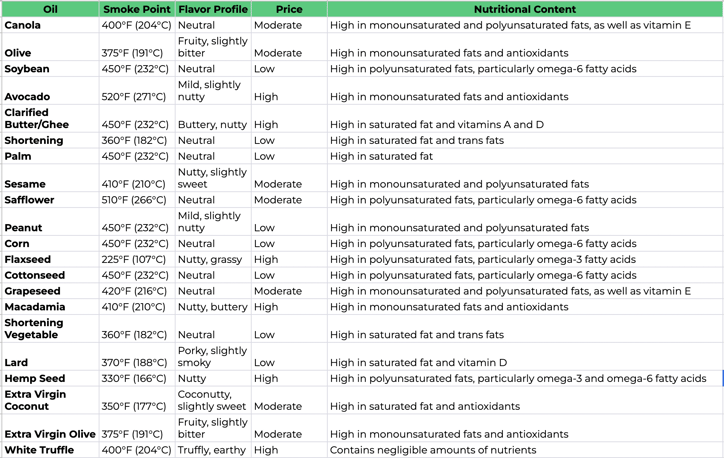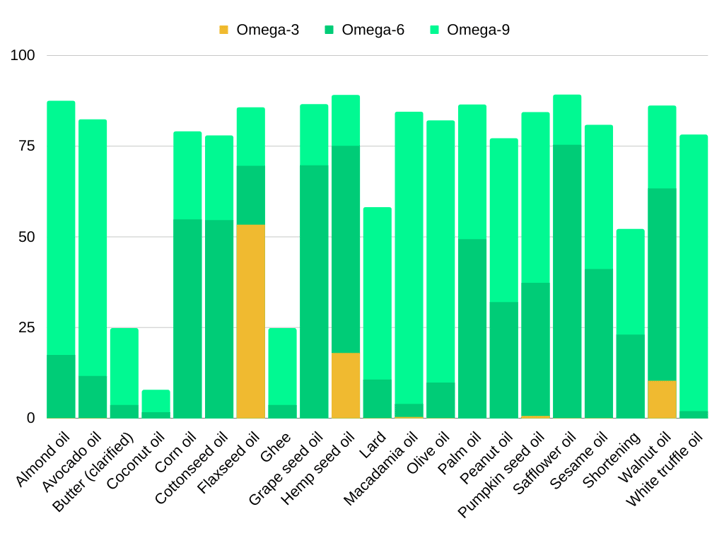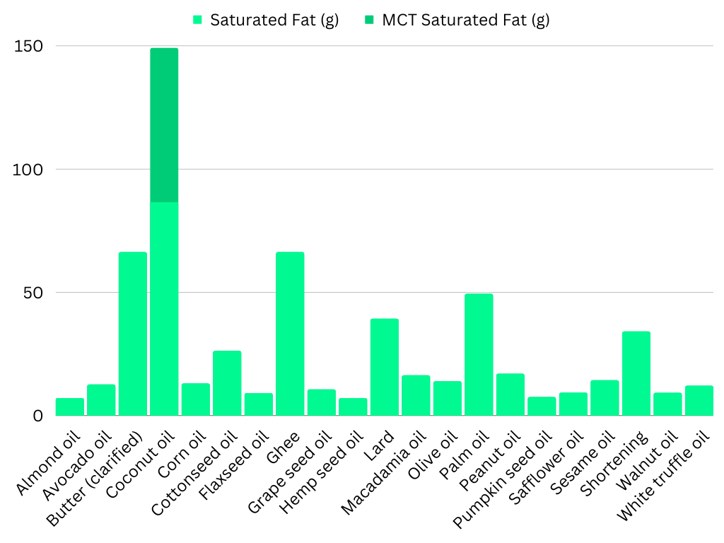
Have you ever wanted to try an exciting new oil you heard about?
Maybe you would like to mindfully incorporate healthier alternatives to the oils you currently use.
In this article, we unlock the secrets of cooking oils with our comprehensive guide! From nutrition facts to flavor profiles and smoke points, we've got you covered.
Instead of sifting through hours of internet research and varying opinions, we lay out the cold hard facts on the common oils for you to make your own informed decision on what is right for you and your dietary needs.
Understanding the various types of oils is essential in creating both delectable and nourishing meals.
Discover the secret to taking your cooking to the next level: understanding the types of oils you use. From smoke points to flavor profiles, nutrition facts to cooking techniques, we've got you covered.
At OnPoint Nutrition, our team of expert dietitians can assist you in selecting the ideal oils that suit your specific needs and preferences. We offer personalized guidance and support to ensure that you make the best-informed decisions about your overall food choices.
Get ready to revolutionize your kitchen with our ultimate guide to cooking oils!
Types of Oils and Fats: Flavor Profiles and Best Uses
Food is not only a basic necessity of life but also an art form, and every ingredient that we use plays a crucial role in the creation of the final dish. One of the most important ingredients that can make or break a dish is oil or fat.
Oils and fats are not only used for cooking but also for enhancing the flavor and texture of food. From olive oil to coconut oil, each type of oil and fat has its own unique flavor profile and best use.
But first, lets give a brief overview of the types of oils we will discuss...
Olive Oil
Olive oil has a distinct flavor profile and is commonly used in Mediterranean cuisine. Extra virgin olive oil is great for salad dressings and finishing dishes, while lower-grade olive oils are best for cooking.
Canola Oil
Canola oil has a mild flavor and high smoke point, making it a popular choice for frying and baking. It's also a great substitute for butter in recipes that call for liquid fats.
Sunflower Oil
Sunflower oil is a neutral-tasting oil that has a high smoke point, making it ideal for frying and sautéing. It's also a good choice for baking and making homemade mayonnaise.
Soybean Oil
Soybean oil has a mild flavor and is used in a variety of dishes, including fried foods, salad dressings, and baked goods.
Coconut Oil
Coconut oil has a sweet, nutty flavor and is commonly used in vegan and gluten-free baking. It's also great for frying and sautéing.
Avocado Oil
Avocado oil has a buttery flavor and a high smoke point, making it great for cooking at high temperatures. It's also great for salad dressings and marinades.
Shortening (Vegetable)
Vegetable shortening is a solid fat that is commonly used in baking. It has a neutral flavor and gives baked goods a tender texture.
Lard
Lard is a rendered pork fat that has a rich, savory flavor. It's commonly used in baking and frying.
Hemp Seed Oil
Hemp seed oil has a nutty flavor and is high in omega-3 fatty acids. It's great for salad dressings and as a finishing oil, but it should not be used for cooking at high temperatures.
Extra Virgin Coconut Oil
Extra virgin coconut oil has a coconutty flavor and is great for baking and cooking at low temperatures. It's also used in some beauty and skincare products.
Extra Virgin Olive Oil
Extra virgin olive oil has a robust flavor and is great for finishing dishes, dipping bread, and making salad dressings. It should not be used for cooking at high temperatures.
White Truffle Oil
White truffle oil has a distinct, earthy flavor and is commonly used as a finishing oil for pasta, risotto, and other dishes.
Walnut Oil
Walnut oil has a rich, nutty flavor and is commonly used in salad dressings and as a finishing oil. It should not be used for cooking at high temperatures.
Pumpkin Seed Oil
Pumpkin seed oil has a dark green color and a nutty flavor. It's commonly used in salad dressings and as a finishing oil.
Clarified Butter and Ghee
Clarified butter and ghee are both forms of butter that have had the milk solids removed. They have a rich, nutty flavor and are commonly used in Indian cuisine.
Palm Oil
Palm oil has a neutral flavor and is commonly used in processed foods. However, its production has been linked to deforestation and habitat destruction.
Sesame Oil
Sesame oil has a nutty flavor and is commonly used in Asian cuisine. It's great for stir-frying, marinades, and dressings.
Safflower Oil
Safflower oil has a neutral flavor and high smoke point, making it great for frying and baking. It's also a good source of omega-6 fatty acids.
Peanut Oil
Peanut oil has a mild flavor and high smoke point, making it great for frying and sautéing. It's commonly used in Asian and Southern cuisine.
Corn Oil
Corn oil has a mild flavor and high smoke point, making it great for frying and baking. It's commonly used in processed foods.
Flaxseed Oil
Flaxseed oil has a nutty flavor and is high in omega-3 fatty acids, making it a great addition to salad dressings and smoothies. However, it should not be used for cooking at high temperatures as it can easily oxidize.
Cottonseed Oil
Cottonseed oil has a neutral flavor and high smoke point, making it great for frying and baking. However, it's also high in omega-6 fatty acids and may not be the healthiest option.
Grapeseed Oil
Grapeseed oil has a mild, nutty flavor and high smoke point, making it great for frying, baking, and sautéing. It's also a good source of vitamin E.
Macadamia Oil
Macadamia oil has a buttery, nutty flavor and is commonly used in baking and cooking at low temperatures. It's also great for salad dressings and as a finishing oil. However, it can be expensive.
Overall, each type of oil and fat has its own unique flavor profile and best use.
It's important to choose the right oil or fat based on your recipe and cooking method to achieve the best results.
Additionally, it's important to consider the health implications of using certain oils and fats, as some are "healthier" options than others.
Cooking Oils and Fats: Smoke Points, Flavor Profiles, and Nutritional Content
Cooking oils and fats are essential ingredients in any kitchen, but with so many options available, it can be overwhelming to know which one to use for a particular recipe.
This chart covers a range of cooking oils and fats, from the most commonly used to the lesser-known, providing information on their smoke points, flavor profiles, prices, and nutritional content.
Here is a side by side comparison of each oil in relation to its smoke point.

Below you will be able to see the specific smoke point, as well as the flavor profile, general price comparison, and the nutritional overview for each of these oils.

Whether you are a professional chef or a newbie in the kitchen, this guide will help you make informed decisions about which oil or fat to use for your recipes, depending on the cooking method and desired flavor profile.
Comparing the Nutritional Profile of Different Types of Cooking Oils
When it comes to cooking, choosing the right oil can make all the difference in terms of taste and health benefits.
These charts compare the nutritional values of popular oils, providing valuable information for those seeking to make healthier choices in their cooking.

Different cooking oils have varying levels of omega-3, omega-6, and omega-9 fatty acids. Omega-3s are known for their anti-inflammatory properties and are commonly found in fish oils, while Omega-6s are also important for our health but too much of it may lead to inflammation. Omega-9s, found in high levels in olive oil and avocado oil, are monounsaturated fats and have been linked to improved heart health.
In addition, some oils with high levels of saturated fat may have lower levels of omega-3, 6, and 9, which could impact their overall health benefits.

*Please note that the values provided are approximate and can vary depending on factors such as the quality of the oil and the method of processing. Additionally, the exact nutrient content of oils can vary depending on factors such as processing methods, growing conditions, and storage.
This handy chart gives you a good idea of how much saturated fat you are dealing with in some of these oils.
Coconut oil is known for having a high level of saturated fat, with over 80% of its total fat content being saturated. This may seem surprising as coconut oil is often seen as a healthy alternative to other cooking oils.
Coconut oil's ranking as a healthy cooking oil is somewhat controversial. While it does have potential health benefits, such as its high smoke point and the presence of MCTs, its high saturated fat content has led some health experts to recommend limiting its use in cooking.
While saturated fat can raise cholesterol levels and increase the risk of heart disease, some studies suggest that the specific type of saturated fat in coconut oil, known as medium-chain triglycerides (MCTs), may actually have health benefits, such as promoting weight loss and increasing HDL (good) cholesterol. However, more research is needed to fully understand the impact of coconut oil on health.
Other oils, such as olive oil, avocado oil, and canola oil, are generally considered to be healthier options due to their higher levels of monounsaturated and polyunsaturated fats and lower levels of saturated fat.
By referring to these charts, you can gain a clear understanding of the amount of saturated fat in different oils, which can be helpful in making informed decisions for your health and cooking needs.
Saturated vs Unsaturated
Did you know that understanding the difference between saturated and unsaturated fats in oils is actually pretty important? Not only can it impact your health (hello, heart disease), but it can also make a difference in your cooking game.
So, let's break it down: saturated fats are the ones you want to watch out for. They can raise your cholesterol and increase your risk of heart disease. On the other hand, unsaturated fats can actually be good for your heart health!
But wait, there's more! The type of fat in an oil can also impact how it performs in the kitchen. Oils with more saturated fat are more stable at high temperatures and are great for frying, while oils with more unsaturated fat are more delicate and can add a lighter flavor to your dishes.
It's worth noting that while some of these oils may have higher levels of certain types of fats, consuming a balanced diet with a variety of different fats is generally recommended for optimal health.
So don't let a high fat content cause you to steer clear of a particular oil, unless you are working with a registered dietitian or physician who instructs you to do so.
It's always a good idea to consult with a nutritionist or other qualified healthcare professional to determine which oils and fats are best for your individual dietary needs.
How Can An Online Dietitian Help Me Choose the Best Oil?
Finding the right balance of oils to use for cooking and nutrition can be a challenge, especially for those with specific dietary needs due to chronic conditions.
However, a competent nutrition coach, such as a registered dietitian or nutritionist, can provide individualized support to help you make informed decisions about your diet. An online dietitian can help you identify the best types of oils to use for different cooking methods and guide you in developing a positive relationship with food and your body.
In addition to providing nutritional guidance, an online dietitian can also address any medical or nutritional concerns that may impact your ability to follow a healthy eating approach.
They can provide accountability and support to help you stay on track and overcome any challenges you may face on your journey towards better health.
At OnPoint Nutrition, our team of skilled experts takes a holistic approach to nutrition counseling. We believe that diet and lifestyle have a significant impact on health and wellness, and we are here to help you get started on the path to better health.
If you're ready to take charge of your health we're here to support you every step of the way.
Taking the Next Steps
We believe that success in incorporating healthy oils into your diet is all about consistency and sustainability. That's why our registered dietitians will closely monitor your progress and adjust your approach as needed to ensure that it benefits you.
Our team of experts has helped thousands of people in their quest for optimal health through nutrition. We closely follow current research and adjust our approach to validated shifts in the nutritional landscape.
Getting in touch with a trained expert, such as OnPoint Nutrition's team of registered dietitians available online, can help you make informed decisions about how to incorporate the ingredients that are right for you into your diet, leading to a healthier and more fulfilling life.
Let's empower you to take the road to the better health that you deserve.

With a knack for turning complex nutrition facts into engaging, relatable content, she’s on a mission to make healthy living fun and accessible. Backed by a stellar team of Dietitians and Nutritionists, Abby breathes life into OnPoint’s mission, inspiring others to embrace the transformative power of good nutrition. Her infectious enthusiasm and innovative approach make her a driving force in the journey towards better health for all.




